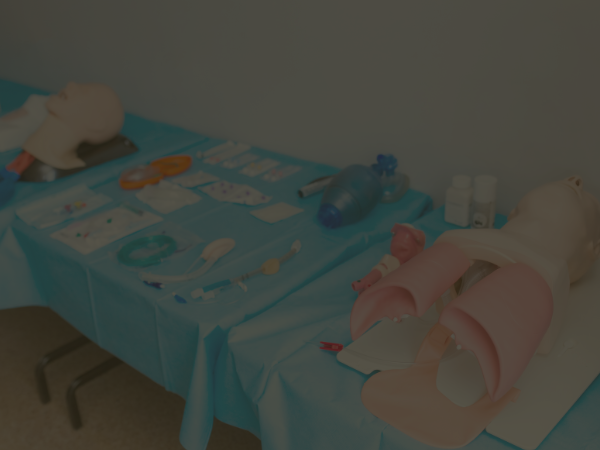If you are looking to prepare to work as a rescuer in any situation, you may be considering your BCLS certification. What is it? Why do you need it? To help you learn what your basic life support certification options are and which one is best for you, consider the following details.
BCLS vs BCLS Certifications Compared
The BLS Certification, which we offer, is a designation given to those who complete basic life support training. That means you will learn a wide range of life saving medical procedures often preformed in emergency situations. The BCLS refers to the basic cardiac life support certification. There is no real difference between the two methods and processes other than who offers them.
BCLS vs BLS are often used interchangeably. There are some differences in these certifications, but both will provide you with valuable training to be able to provide cardiopulmonary resuscitation and basic AED usage in an emergency situation.
Also note other types of certifications are available as well. For example, it may be important to compare ACLS vs BLS certifications and which may be a good fit for your specific needs and goals.
BLS Meaning
What is BLS certification? BLS certification, which is the type of certification we offer, is the most recognized certification for Basic Life Support training. It covers the following:
- A wide range of emergency scenarios that would require the use of CPR, AED use, and managing a patient’s airway
- It is designed for numerous healthcare professionals to use but also for most non-medical professionals to use to provide care to a person in emergency situations
- It is a general certification that can be used for most types of medical care preparedness
- Commonly recognized as a verification that you have the necessary training to provide emergency life saving support
- Requires significant training and certification in respiratory and cardiac arrest care, providing AED usage training as well
Recognizing the BLC certification and meaning is critical if your employer or other organization requires you to have CPR training. Because it is widely recognized and verifiable, it is often considered the ideal choice.
BCLS Meaning: What is BCLS?
Basic cardiopulmonary life support (BCLS) is another type of basic life support training. It is provided by various providers. This type of certification provides the following:
- This type of training is more cardiac specific in the type of care it teaches for emergency care as well as initial management of incidents related to the heart.
- It is often helpful to healthcare professionals who are consistently working with cardiac patients or in situations where there is a higher risk for cardiac failure or complications. That includes cardiac ICUs and emergency room departments.
- It is a more specialized type of basic life support training that is heavily focused on cardiac care, but offers the same strategies and methods found in BLS.
- Having a BCLS certification indicates that the person has received specific supportive training for emergency needs related to cardiac care.
- It includes the same basic types of training and skill set but is often more structured to meet the needs of cardiac-specific treatments.
While both of these certifications are valuable, and both teach the same basic skills for protecting the life of a patient in an emergency situation, BCLS typically focuses on these skills and terminology as it relates to cardiac-specific care.
How to Determine Which Is Best for You: BCLS vs BLS
Making the right decision about which certification to invest in is important. While both can offer critical stills to individuals, it helps to consider both. If you want to establish a career in the medical field, selecting either of these certifications could be critical, though the BLS certification is more universally recognized.
Before making a decision on BCLS vs BLS, consider your future goals and objectives and any requirements of employers within that industry. For those looking for general certification for everyday use and preparedness, the BLS certification tends to be the most direct option. Consider the following comparison factors otherwise.
Job Responsibilities
First, consider the responsibilities you will have within your desired career path, including any initial entry-level positions you may need to complete before advancing in that field. Consider:
- Does your role involve frequent interaction with patients who have cardiac issues or may have cardiac-related health needs?
- Consider the level of responsibility you, personally, will have in responding to medical emergencies that are specifically cardiac-related.
- Determine if cardiac care is likely to be a factor when administering emergency care to a patient in the most common scenarios, such as the types of events or exposures you may have.
The Environment You Work In
Also note the importance of the environment you will work in, as this can play a significant role in the long-term effectiveness of any certification. Consider these factors based on the likely environment you plan to work in:
- What types of medical emergencies could happen within this environment?
- What types of medical emergencies are you most likely to handle within that environment?
- Determine if cardiac care will likely be a significant factor in the medical support you provide, especially to patients with complicated cardiac needs patients.
Note that, overall, BLS certification does provide training for caring for patients with cardiac treatment. The objective will still be to learn how to care for patients who have cardiac needs. The difference in programs is specifically in the examples and language used within programs. For those who will work in an environment with numerous types of medical emergencies that are more general rather than cardiac-specific, having an education that provides more extensive experience across a broader range of medical emergencies can be beneficial. In short, a cardiac focus is not always ideal.
Determine Career Goals
The next objective to consider in BLS vs BCLS is the career goals you have beyond your current or expected initial job. Take a long look at your objectives. Note that, in most situations, BLS recertification and BCLS recertification are necessary. That means that, though you may benefit from one certification now, down the road, you will likely need to recertify. At that time, you may elect to choose the other type of certification if it benefits future decisions. Otherwise, consider the following factors.
- What are your long-term career objectives? Carefully look at the most likely medical and healthcare-related care you will provide, which will involve just cardiac support or other areas.
- Will specializing in cardiac care provide more opportunities for you, or is a more broad level of education in emergency care likely to be more beneficial to you?
While both methods require recertification, it is easier to maintain the same certification when it comes time to update.
Not everyone that completes BLS certification will work directly in the healthcare industry either. Many people are employers, managers, or safety professionals who want to learn the skills necessary to save a person’s life. In these situations, having a more robust rounded level of education could be beneficial to helping more people facing medical emergencies within the workplace or community setting. Studies indicate that those who are lay people will find BLS training an effective option overall.
What You Desire to Learn
Without a doubt, learning to provide emergency critical care to patients in need is a worthy and incredible service to the community and an excellent skill to have. Yet, you should follow your goals and desires. Some people will find that a focused level of education just on cardiac care could be beneficial to them and rewarding. For others, a more comprehensive background and educational path could be a better objective.
In training reference, also consider your current depth of knowledge and your needs for advancing specific skills. For those who want to select a more general base of medical emergency knowledge, especially if you plan to work in a specific area of healthcare that is new to you, then choosing cardiac focused care could help.
Choose what provides you with the most likely benefit based on what you already know and want to learn.
Employer Requirements Matter
One of the most specific factors to consider when choosing BLS certification or BCLS certification is the employer’s requirements. If you are already within a job that requires this training or you plan to apply to a job or position requiring these certifications, follow up with human resources to learn which type of certification is necessary.
As noted, BLS certification is widely recognized and often sought after by employers, but some may require BCLS certification instead. In situations where your employer has specific requirements, that is typically the certification you need to choose.
What Are the Benefits of Having a BLS Certification?
The BLS certification is a well-rounded, basic life saving training and certification program. It helps people prepare to support patients in many medical emergency situations. Some of the specific benefits of this educational tract include the following:
- Emergency Response Skills: Students learn to perform and become efficient at CPR. They also learn how to properly and effectively analyze for, apply, and use an AED. This enables the medical response professional to restore proper heart function.
- Patient Outcome Improvement: In most situations, those who obtain this type of certification will gain critical skills that improve the health outcome of patients in critically ill scenarios. This includes providing help for cardiac as well as respiratory emergencies.
- Confidence in a Vast Number of Scenarios: Those who complete this training will be confident to assess a variety of situations and scenarios to provide the highest level of support across most situations. Rescuers gain the skills necessary to facilitate care across most medical emergencies.
- Compliance with Regulations: Those who complete this educational tract also gain the skills necessary to meet all compliance requirements related to BLS certification, including those established and maintained by regulatory bodies, including employers and professional organizations in healthcare.
- Develop Core Skills for Various Industries: Those who wish to work in healthcare across a range of specializations and provide medical support to patients in various hospital departments, medical center units, and various doctor offices benefit from this type of certification.
- Students: The Journal of Medicine and Life notes that first and second-year medical students are likely to benefit from the use of BLS training early on, gaining incredible insight into life saving strategies.
When Is a BCLS the Better Option for Certification?
There are some situations where a person will benefit from completing the BCLS certification. Keep in mind this certification provides cardiac-specific training for basic life saving measures. Some of the reasons why you may wish to choose this method include:
- Cardiac Care ICUs: Those who work in a cardiac care critical care unit, such as in a hospital, may benefit from this more specific level of care.
- Cardiac-specific Medical Centers: Individuals who wish to learn cardiac-specific scenarios to prepare for emergency situations may benefit from this type of training.
- Experienced Professionals: Those who are experienced in CPR and AED uses but may be transferred to a cardiac care unit, or a cardiologist service may benefit more so from this type of training, assuming they already have completed or are knowledgeable in traditional basic life-saving measures.
What to Know About Both Certifications
Before choosing any type of certification, it is critical to know what your specific goals are, including the requirements your employer sets. For those who are taking their first step towards obtaining an education in basic life saving measures, a more broad, overall focus on how to do so could be critical. Not every medical emergency is related to a cardiac event as the onset factor. Having a more broad understanding of medical emergency care could be helpful. This type of broad level of medical emergency skill training is typically found at BLS training certification providers.
By contrast, those working within a space where they are most likely to experience patients with cardiac related events, such as in cardiological departments, cardiac surgical centers, and related facilities, may benefit from learning through more focused examples and scenarios. This may lead to the benefit of using BCLS training.
Choosing the Best BLS Certification for Your Needs
At Save a Life by NHCPS, we strive to provide individuals with comprehensive education and training that prepares them for medical emergencies of all types. With comprehensive BLS training and certification, rescuers can feel confident they will have the skills necessary to achieve long-term objectives in the healthcare industry. With online programs of study available, it is possible to get started as soon as today.
Learn more about our BLS Certification and Recertification programs and how well they can work to meet your needs.









Leave a Reply